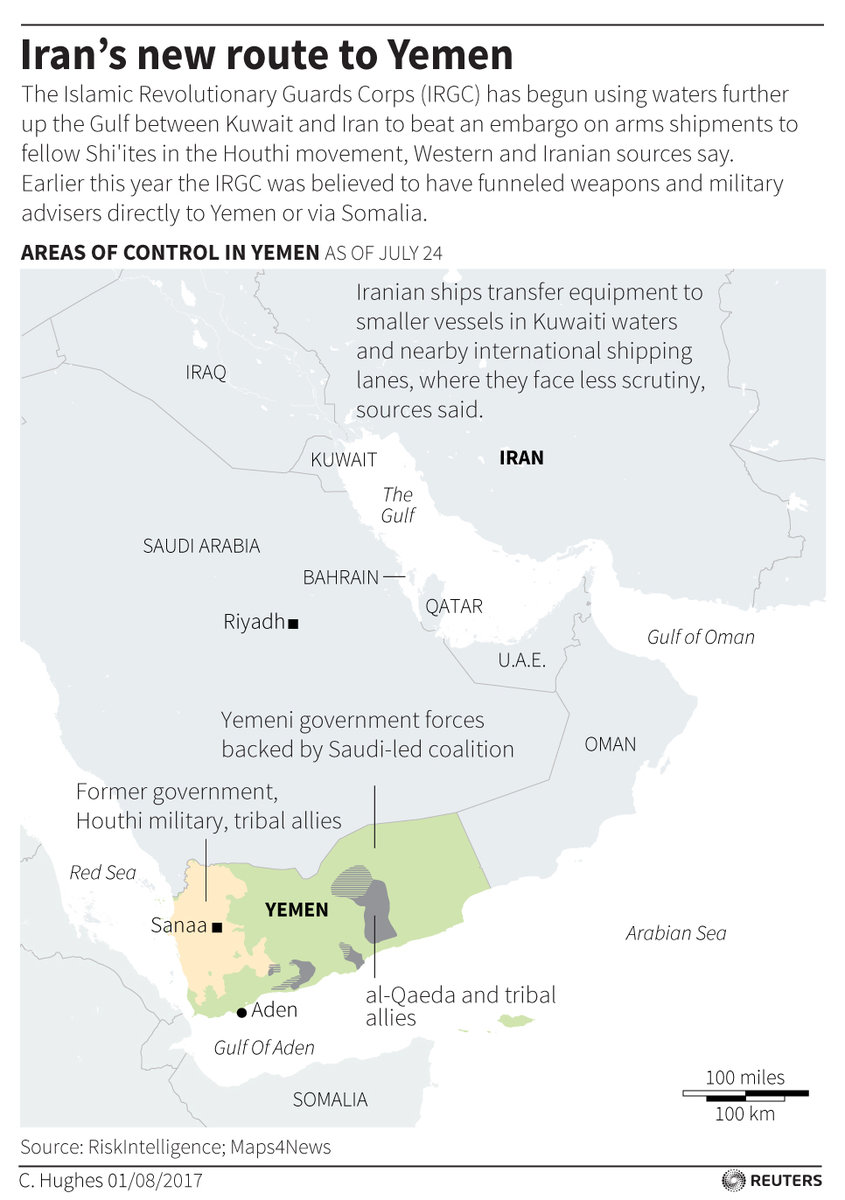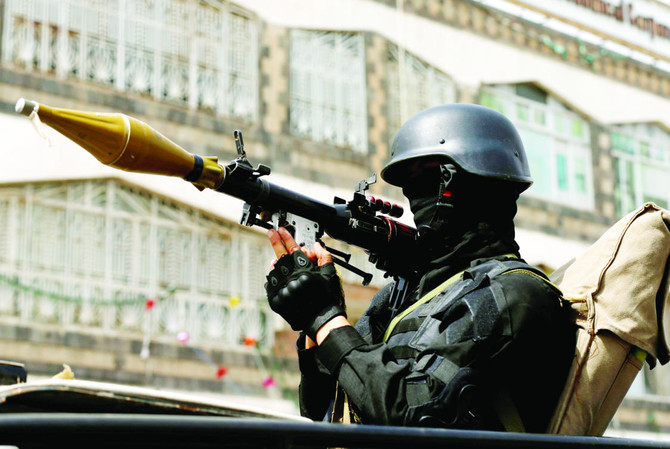JEDDAH: Iran’s Revolutionary Guard Corps (IRGC) has started using a new route across the Arabian Gulf to funnel covert arms shipments to Houthi militias in Yemen.
This was revealed in an investigative report by Reuters, which quoted sources who it said “are familiar with the matter.”
In March, regional and Western sources told the news agency that Iran was shipping weapons and military advisers to the Houthis either directly to Yemen or via Somalia.
But this route risked contact with international naval vessels on patrol in the Gulf of Oman and the Arabian Sea.
For the last six months, the IRGC has begun using waters further up the Gulf between Kuwait and Iran as it looks for new ways to beat an embargo on arms shipments to the Houthis, Western and Iranian sources told Reuters.
Using this new route, Iranian ships transfer equipment to smaller vessels at the top of the Gulf, where they face less scrutiny.
The transhipments take place in Kuwaiti waters and in nearby international shipping lanes, the sources said.
“Parts of missiles, launchers and drugs are smuggled into Yemen via Kuwaiti waters,” said a senior Iranian official.
The official added: “What is especially smuggled recently, or to be precise in the past six months, are parts of missiles that cannot be produced in Yemen.”
Only three days ago, a missile launched by the Houthis toward the Saudi city of Makkah was intercepted by Saudi Air Defense.
Acting with impunity
Oubai Shahbandar, a Syrian-American analyst and fellow at the New America Foundation’s International Security Program, told Arab News: “Iran using smuggled drugs to help fund and transport ballistic missile components to the Houthis is no surprise. What’s interesting is that the Houthis just earlier this week were adamantly denying that they received Iranian missiles. But this report clearly shows that the IRGC is boasting that it’s helping a regional terror group that very recently attempted to fire missiles aimed at the holy city of Makkah.”
He said the IRGC is signaling that it can act with impunity because it has not faced meaningful military repercussions for its actions.
Harvard-based Iran expert Majid Rafizadeh said Tehran has significantly stepped up its transfers and smuggling of arms to terrorist groups and militias, including the Houthis.
“This development is significant because it highlights Iran’s increasing defiance of international law and its continuing attempts to destabilize the region through terror,” he told Arab News.
“A UN resolution adopted in 2007 forbids Iran from transferring and selling arms. But Iran has repeatedly done so without consequences or being held accountable. The international community ought to lead robust efforts in halting Tehran’s support for terror groups,” he said.
“The report also reveals Iranian leaders’ hypocrisy as they have repeatedly denied backing the Houthis,” Rafizadeh added.
“The IRGC is the essence of conflicts and civil war in many countries, including the Arab nations of Yemen, Syria and Iraq. Iran rules through violence, radicalization and militarism. It creates conflicts because it benefits from instability. Tehran resorts to any unlawful act to achieve its regional hegemonic ambitions and export its revolutionary ideals,” he said.
“The US recently blacklisted the IRGC and sanctioned Iran. The Iranian regime, particularly the IRGC and its affiliates, should be isolated and monitored closely by the international community and regional powers.”

Cash and drugs
Cash and drugs can be used to fund Houthi activities, said the Iranian source.
Yemen is more than two years into a civil war pitting the Houthis against the government of President Abed Rabbo Mansour Hadi. More than 10,000 people have died in fighting and a cholera epidemic has infected more than 300,000 in a country on the brink of famine.
In backing the Houthis against a coalition led by its Saudi Arabia, Iran is stepping up support for a Shiite ally in a war whose outcome could sway the balance of power in the Middle East.
Efforts to intercept military equipment by the coalition have had limited success, with no reported maritime seizures of weapons or ammunition during 2017 so far and only a few seizures on the main land route from the east of Yemen.
Independent UN investigators, who monitor Yemen sanctions, told the Security Council in their latest confidential report, which Reuters has seen, that they continue to investigate potential arms trafficking routes.
They said the UAE — which is part of the coalition — had reported 11 attacks since September 2016 against its ground forces by Houthis using drones, or UAVs, armed with explosives.
“Although Houthi-aligned media announced that the Sanaa-based Ministry of Defense could manufacture the UAV, in reality they are assembled from components supplied by an outside source and shipped into Yemen,” the report said.
The report added that the Houthis “will eventually deplete their limited stock of missiles.” This would force the Houthis to end a campaign of missile attacks against Saudi territory unless they are resupplied from external sources.
An earlier UN report in January said the Houthis needed to replenish stocks of anti-tank guided weapons.
The arms smuggling operation may not turn the tide of the conflict, but it will allow the Houthis receive stable supplies of equipment that is otherwise hard to obtain.
Safe route
“The volume of the activity, I don’t call it a trade, is not very large. But it is a safe route,” a second senior Iranian official said.
“Smaller Iranian ports are being used for the activity as major ports might attract attention.”
Asked if the IRGC was involved, the second official said: “No activity goes ahead in the Gulf without the IRGC being involved. This activity involves a huge amount of money as well as transferring equipment to Iranian-backed groups in their fight against their enemies.”
A third senior Iranian official also confirmed the shipment activity and pointed to IRGC involvement.
The IRGC is Iran’s most powerful internal and external security force, with a sophisticated intelligence and surveillance network together with elite units which are playing a key role in the war in Syria in support of the government.
The IRGC declined to comment on the arms shipments and Iranian Foreign Ministry officials could not immediately be reached.
Hundreds of ships sail through the Bab al-Mandab and Strait of Hormuz every day — waterways which pass along the coasts of Yemen and Iran. Many are small dhows, which are hard to track.
Western shipping and security sources said that since March there had been an increase in suspicious activity involving Iranian-flagged ships in waters near Kuwait.
“Waters around Kuwait are being used by Iranians to funnel ... equipment to Yemen,” said an international arms dealer based in the Mediterranean area with knowledge of the matter.
“Consignments are either transferred to other craft, such as small boats, or they are dropped near buoys to be picked up by passing ships.”
The arms dealer said there were many coves and deserted bays in Iraq that also provided opportunities for this type of covert activity.
The Western sources said consignments were transported from smaller Iranian ports across the sea lanes near Kuwait, which is 100 nautical miles from Iran.
To avoid detection, the mainly Iranian-flagged vessels switch off their identification transponders, sometimes for days. They rendezvous with other ships or drop supplies close to buoys, so the consignments can be recovered for onward transport, the sources said.

























